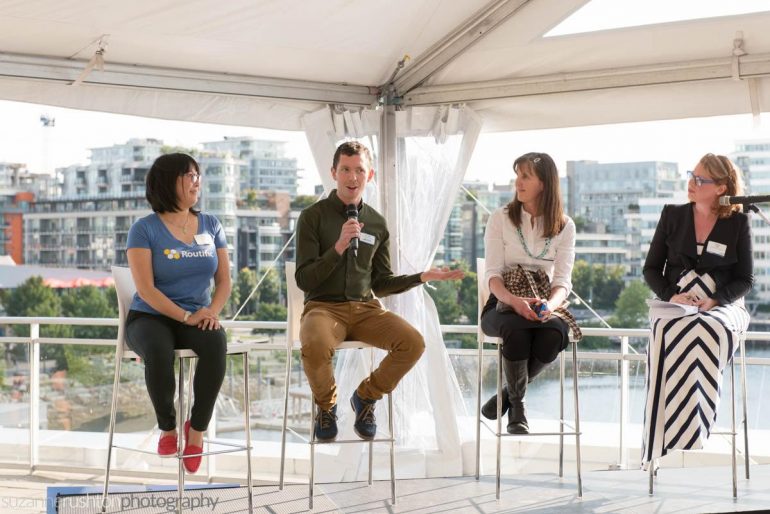Make an impact? How about making money? Anything that deviates from a startup’s core focus on making a profit needs to be set aside for the good of the company — right? Who’s got time for social impact, much less saving the planet?
These and other retrograde ideas got trash-talked into oblivion at the Startup City Impact: Mythbusting Mixer presented by the Vancouver Economic Commission at the iconic Science World rooftop venue this week. Speakers from Vancouver’s tech community took lightning-round turns addressing some of the most common myths around impact businesses, sharing their thoughts with a lively crowd of attendees.
Is it too costly for companies to be eco-friendly? Suzanne Ma, co-founder of Routific, a route optimization solution, suggested the opposite: that being environmentally-friendly can be at the heart of a business model.
“Social enterprise is dead. Long live the impact economy.”
– Keith Ippel, Spring University founder
“UPS is the most efficient fleet, not because of forbidding drivers from making left-hand turns, but from route optimization,” she said, noting that this optimization doesn’t just help them stay on top business-wise, but results in less pollution. Even better, it’s easier than ever to jump on this kind of solution. “Most companies doing delivery just try to eyeball or Google Map it, and spend hours on route logistics every day — when, by investing in a solution, you could take care of it in two minutes.”
Addressing the next myth that Vancouver-based companies that try to have an impact will have a harder time reaching a global marketplace, Aspect Biosystems co-founder Tamer Mohamed pointed to his own company’s record as a case-in-point. They can 3D print human tissues available for testing, helping drug companies bypass inefficient animal testing that might not even be applicable to human health. “Ninety percent of drugs never make it to market because of the current models,” Mohamed said. But by directly testing with engineered tissues, drug companies can create drugs that are cheaper and get into the market faster. It’s an idea that is already able to impact the pharmaceutical industry globally.
As to whether you can make money or get a job in the social enterprise sector, Spring University founder Keith Ippel had a different take. “Actually, that’s fair, social enterprise is dead – long live the impact economy.” There are thousands of B-Corporations in many sectors across the country, dedicated to solving big problems, not just making a profit – and the Spring organization has helped 120 companies in Vancouver that are looking to build companies making a difference, he said. He noted that nearly 650 people had already signed up for a career fair matching job seekers with impact companies, showing there was no lack of jobs in this sector.
On the potential for technology companies to have a positive impact on their local communities, Spare Rides CEO Kristoffer Vik Hansen explained how his company aims to deal with the ever-present traffic conundrum both locally and across North America. Noting that 80 percent of vehicles in the morning commute have a single driver, simply by making it easier for commuters to share a ride, you can solve a number of problems (not just transportation congestion). Instead of spending an hour on your own cursing at other drivers, you could be doing productive work, getting to know new people and generally providing a better environmental outcome – all thanks to the synergy of using a simple app.
Overall, the mythbusters spoke with a single message: companies that want to be impact businesses aren’t doing it as an add-on, through philanthropy, but by putting impact at the heart of their organizations.


